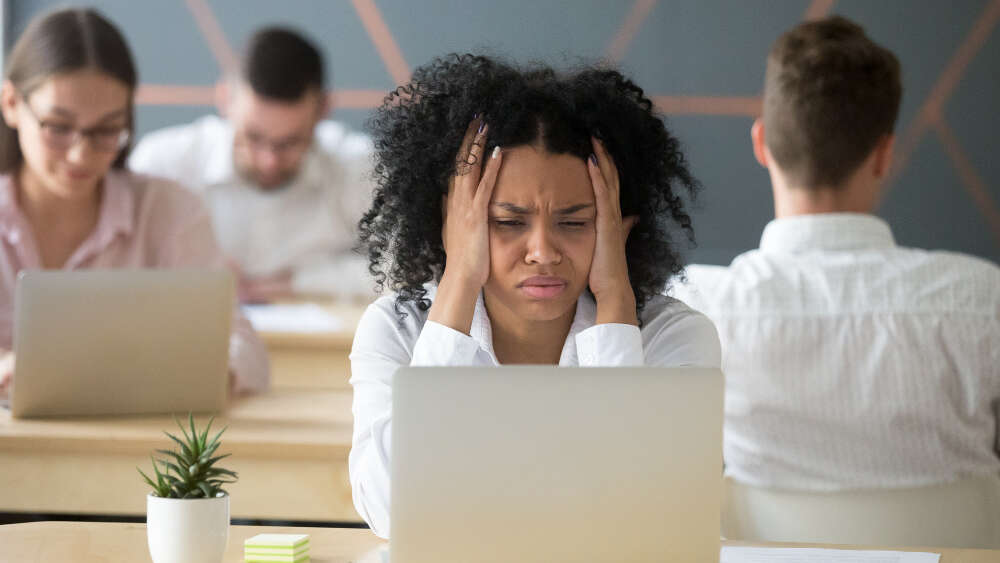Why you could have an anxiety hangover in 2021
How to deal with work pressures this year
Last year changed the way many Australians work. And while not all of 2020’s changes were bad – with some enjoying the ability to work from home – COVID-19 has left plenty of workers with an anxiety hangover.
“There have been more economic pressures than we’ve seen in the past. A lot of businesses have had questions around the survival of their business hanging over their heads, and employees have been a little worried about their job security. So that’s been an extra pressure. And I think that will endure for the next year or so,” says Dr Jenny George, CEO of Converge International.
Converge provides mental health support to the corporate sector. During the past 12 months, it has done so for more than 900 organisations across Australia, as many workers have struggled with a heightened sense of anxiety and depression.
“During the first [COVID] lockdown [in March 2020] we saw anxiety, especially anticipatory anxiety – worry about the future and what might happen,” George explains.
“What happened in Lockdown Two [in Victoria, during August to October] was depression, because people settled in and realised this is going to be my life for a while and it’s not great.
“Even people who didn’t have really any mental health issues at all, still felt a degree of flatness and certainly were on the way towards potentially feeling depressed. We saw that in very widespread ways during Lockdown Two.”
Unfortunately, just like COVID-19 itself, the anxiety that characterised our society – including the workplace – in 2020 is still hanging around in 2021.
“What we’ve seen this year is that anticipatory anxiety has come back a bit,” says George.
“That’s largely been due to the very quick, snap lockdowns and border closures – lots of things changing so quickly that it’s very hard to plan and embark on normal things. To plan a wedding, go to see family, have a holiday – all of those things we now have to put caveats around and we say, ‘I don’t know if I can plan that. I don’t know what the future will be.’ So we’re back to that kind of anxiety about the future state again.”
“We’re having to change all of the things that we do to cope with stress, at the same time as we’ve got new stresses.” – Jenny George
According to George, the pandemic’s “double whammy” is that the usual stress relievers have been disrupted. “Exercise and the way we access it has changed,” George offers as an example.
“We can’t necessarily turn up to the gym or the swimming pool or do other things in our normal routine in the same way we used to. And we can’t see friends in the same way we used to. So we’re having to change all of the things that we do to cope with stress at the same time as we’ve got new and, in some cases, much higher stresses as well.”
George continues, “From a Christian perspective, having to deal with church community changes [like moving online] have made it much more difficult for us to, again, activate the normal ways that we think about and cope with change.”
This is all on top of usual workplace pressures, she notes, such as juggling work demands and family, and other relationships.
George will be speaking on the topic of work pressure at City Bible Forum’s 2021 Life@Work Conference, being held online for the first time this year. Over 1000 delegates are expected to join across the country, with 100 conference watch parties scheduled to take place on Saturday, February 20.
Alongside her co-speakers – “mathemagician” Eddie Woo, author and speaker Dr Sam Chan, and blogger Stephen McAlpine – George will help Christian workers tackle the particular pressures they face in the “new normal” workplace.

2021 Life@Work Conference speakers (clockwise from left): Eddie Woo, Jenny George, Stephen McAlpine, Sam Chan.
When asked her advice on how to address work stress in 2021, George says the solution lies, in part, in “mental fitness”.
“There’s four big areas where you can work on your mental fitness and they’re mind, body, spirit and community,” she explains.
Four steps to mental fitness
“In terms of mind, it’s all of those habits of a positive mindset: mindfulness, having a growth mindset, looking at a situation as a learning opportunity.
“Body is all those good things that you’ve heard about, like getting good sleep, eating good foods, exercise and not overindulging in drugs and alcohol.
“In terms of spirit, which is a really important one for Christians to be aware of, there’s some very important data about connection to nature, to the created world around us, being a protective factor for mental health and our wellbeing. And having meaning and a sense of purpose in life is also incredibly important.
“Giving to others … are incredibly protective for our wellbeing and mental health.” – Jenny George
“None of these factors are a surprise for Christians because they’re all built into the way that we are designed and created as God’s creatures …
“The last one is community, which again is very resonant for Christians; meeting with others and having good, strong social connections is incredibly important. And also giving – this is one that I think Australians perhaps don’t understand well enough.
“Giving to others, both in acts of kindness but also in giving money and time, volunteering and so on, are incredibly protective for our wellbeing and mental health.
George is quick to point out that while the four areas she listed “are built into a pattern of Christian life”, t’s that does not mean Christians never get mentally ill. “I don’t want to give that impression,” she highlights. “But, certainly, these factors in a Christian lifestyle are well evidenced as being protectors for mental health.”
George also adds these mental fitness strategies won’t solve every problem, and workers need to reach out when the pressure feels too great to bear.
“Of course sometimes it is hard for us to cope with things ourselves … So I would never suggest to someone, ‘Look, just manage it on your own’,” she clarifies.
“It’s never a bad idea to call someone, because in the worst case scenario, you’ve spent an hour talking to someone who was helpful and then you go,’Yeah, look, I think I’ve got it.’
“But in some other scenarios, you absolutely need professional help because you’re not going to necessarily be able to do it on your own. So I think it’s always helpful to get a bit of help.”
Add to Calendar
'Under Pressure' – Life@Work Conference 2021



